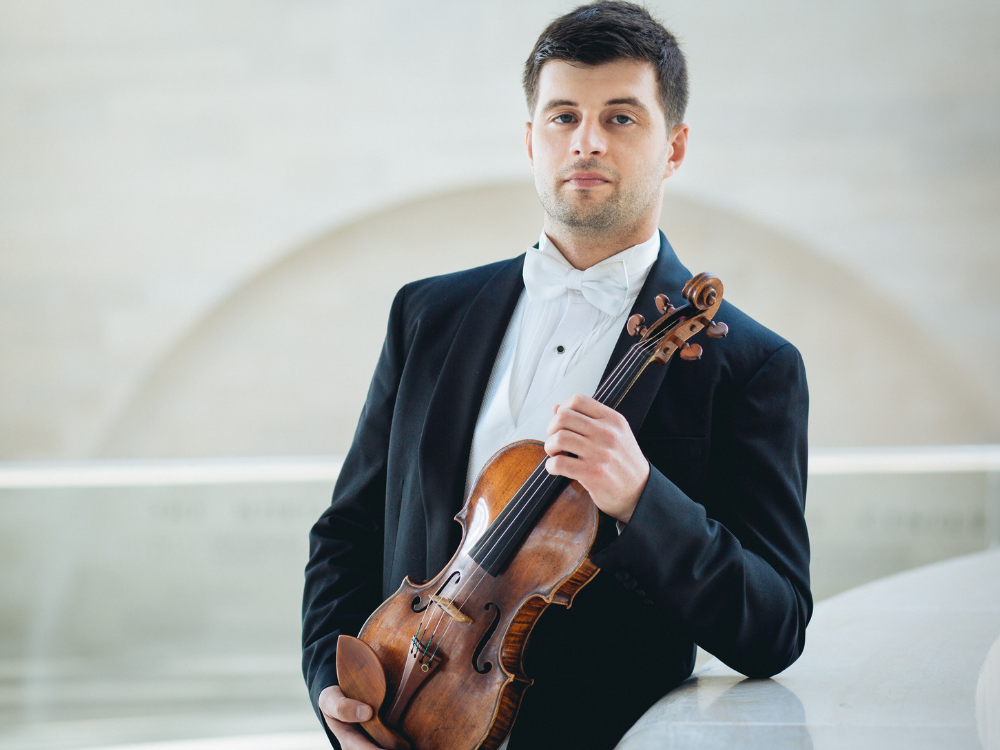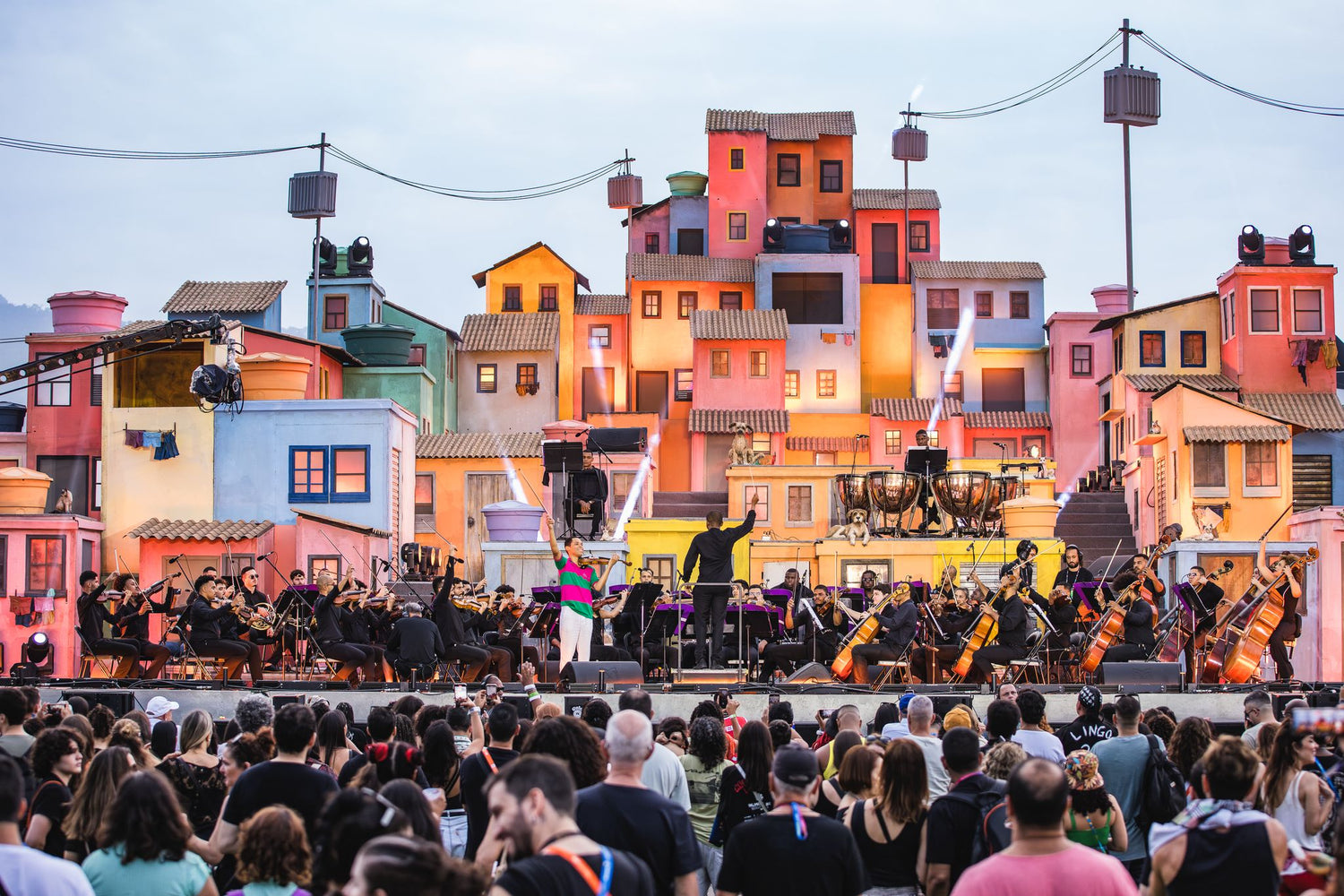Interview with Nathan Olson
From formative years at a unique school — much like Hogwarts for music — to a Concertmaster Academy, violinist Nathan Olson now brings his wizardry to the Dallas Symphony Orchestra as co-concertmaster.

By Rachel Watkins
He’s a math whiz. He plays tennis. He’s in a “boy band.” He’s a hot sauce aficionado. Oh, and of course, he works magic with violin strings. There’s not much Nathan Olson doesn’t do.
A native of Berkeley, California, Nathan now lives in Dallas, Texas where he became co-concertmaster with the Dallas Symphony Orchestra in September 2011. He was recently appointed adjunct faculty at Southern Methodist University, previously serving as adjunct faculty at the University of North Texas College of Music from 2013 to 2016.
A graduate of the Cleveland Institute of Music’s prestigious Concertmaster Academy, Nathan also minored in mathematics and music theory there. But, perhaps the real lasting impact of his time at CIM was the development of the Baumer String Quartet with three other students in his class; they’re now widely acknowledged as one of the finest young quartets in the country.
Here’s what else Nathan had to say…
First things first: Let’s talk about your weapon of choice. What violin do you play?
Recently, this has been a bit in flux. I had been playing on a Filius Guarneri violin until a few months ago; the owner wanted to sell it. So, I recently started playing on another really beautiful instrument, a Tononi c. 1710.
The Crowden School is kind of like Hogwarts for musicians, right?! Tell us about your time there.
Well, The Crowden School is definitely unique. It’s a fourth through eighth grade private school that puts classical music at the heart of our educational studies. The school is quite small; there were about 50 students when I was there. It was named for Scottish violinist and founder Anne Crowden, who I was lucky to study with for several years until she passed away in 2004. She was an incredible yet imposing woman; we were all a bit terrified of her. But, it was really a combination of admiration, awe, and fear — her passion and drive came from such a good place, her love for music and for us.
" Music can really be such a great learning tool for life in general. "
What teachers have influenced you the most?
I was lucky enough to grow up in Berkeley, where there was a focus on art and culture. And, of course, we had Crowden. I had the good fortune to study privately with Anne while I attended school there, so that was really special. My teachers while at the Cleveland Institute of Music, William Preucil and Paul Kantor, were incredible influences on me as well. They both helped me fulfill my potential and grow into the musician I wanted to be.
What was your daily music practice like while you growing up?
Thanks to Crowden, it was probably more structured than other people my age. Every morning from 8 a.m. to 10 a.m., we had techniques classes, chorus, chamber orchestra, and chamber music. The focus on chamber music was especially exciting, as this is quite rare at those grade levels. We learned how to work together as a small group of musicians and took turns leading and following, solving problems, trying out different ideas. Music can really be such a great learning tool for life in general.

When friends are in town, where do you take them?
It’s Dallas, so barbecue or tacos are generally a must — although I have to say that I sometimes miss the focus on burritos that we have so much of in California. I currently live in the Lower Greenville area, so hanging out in that neighborhood is generally a good time.
What’s a typical day like for you with at the Dallas Symphony Orchestra?
During a typical performance week, we have rehearsals on Tuesday and Wednesday, followed by dress rehearsal on Thursday in preparation for the concert that begin Thursday evening and run through Sunday. We have Monday off. One of the biggest adjustments coming out of school was this condensed time period to learn and perfect the music; it’s a quick turnaround in just a week.
What has been your most memorable concert with the Dallas Symphony?
I’m in my eighth season now, but my first year at the DSO was pretty memorable. For one of our subscription weeks, we performed Rimsky-Korsakov's Scheherazade - the solo violin plays the role of a sensual, seductive woman whose tales of 1,001 Arabian Nights mesmerize a sultan. It was my first chance to play these beautiful solos with orchestra, after years of working on them for orchestra auditions. Also, about six years ago, we toured Europe, performing in the great halls of Vienna, Amsterdam, and more. That was pretty incredible.
" One of the biggest adjustments coming out of school was this condensed time period to learn and perfect the music; it’s a quick turnaround in just a week. "
Tell us about your Baumer String Quartet — and why the name “Baumer”?
I knew David and Aaron from the Crowden School in Berkeley, but the three of us met John at the Cleveland Institute of Music and started playing together there. When we graduated, we wanted to keep it up — but we lived in four different places across the country. We try to find weeklong projects that combine teaching and performing; we're actually coming back to Dallas in May for a residency at Southern Methodist University.
As for the name, it comes from The Royal Tenenbaums movie. “Baumer” is the nickname of tennis prodigy Richie’s character, played by Luke Wilson. We’re all tennis players and fans — in case you’re wondering about the tennis photos on our website.
We hear you’re a Golden State Warriors fan. Who’s your favorite player?
Oh, that has to be Steph Curry for sure. I might have a few too many sports posters around the house.
Tell us about your collection of hot sauces. Any favorites?
I joined a hot sauce of the month club for a year. Yes, it’s a thing. Now, I have a somewhat embarrassing amount of them in my refrigerator. But, it has definitely upped my spice tolerance. As for favorites, I do have a soft spot for good old Sriracha. There’s another sauce I like with cherry; it’s pretty aggressive, but the fruit helps temper the heat.
Do you have any tips for young musicians who want to get to that next level?
One thing I can say is that you have to practice hard. I spent so many hours alone in the practice room; it feels secluded, but it’s just something you have to do. Playing chamber music is a huge benefit because the skills you learn as you play together in a group are invaluable. If you're a good chamber musician, you can be a good musician in any scenario! I’d also say that it’s important to be open to creating your own opportunities. It’s easy to only do the concerts that are scheduled for you. But, you can go further if you make connections with other people and try to plan some of your own performances. And, of course, treat people well and be nice to everyone — that’s good life advice, too.
How did you find out about Coregami and how have the shirts been helpful to you?
Kevin [the founder of Coregami] and I met pretty early on when I first moved to Dallas; a mutual friend of ours had a Christmas party and we immediately hit it off. We’re tennis partners now. But, when I first met him, he subtly mentioned an idea he had about performance-based shirts. I was enthusiastic about it from the beginning because musicians are, in effect, small-muscle athletes trying to perform in strict clothes designed for formal galas and events. Anyway, my go-to shirt is the Gershwin; I perform in it every week at the DSO, and it's stylish, breathable, cool, and comfortable. I also love the new Miles Mandarin; our quartet wore them at a recent concert in Ft. Worth and fell in love with the shirt immediately.
" My go-to shirt is the Gershwin. It's stylish, breathable, cool, and comfortable."
Learn more about Nathan here.






